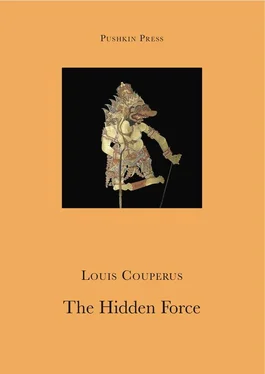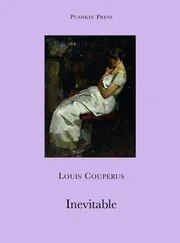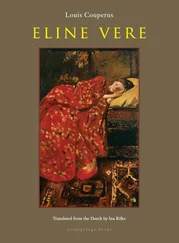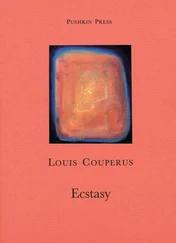Louis Couperus - The Hidden Force
Здесь есть возможность читать онлайн «Louis Couperus - The Hidden Force» весь текст электронной книги совершенно бесплатно (целиком полную версию без сокращений). В некоторых случаях можно слушать аудио, скачать через торрент в формате fb2 и присутствует краткое содержание. Год выпуска: 2012, ISBN: 2012, Издательство: Pushkin Press, Жанр: Классическая проза, на английском языке. Описание произведения, (предисловие) а так же отзывы посетителей доступны на портале библиотеки ЛибКат.
- Название:The Hidden Force
- Автор:
- Издательство:Pushkin Press
- Жанр:
- Год:2012
- ISBN:9781908968227
- Рейтинг книги:4 / 5. Голосов: 1
-
Избранное:Добавить в избранное
- Отзывы:
-
Ваша оценка:
- 80
- 1
- 2
- 3
- 4
- 5
The Hidden Force: краткое содержание, описание и аннотация
Предлагаем к чтению аннотацию, описание, краткое содержание или предисловие (зависит от того, что написал сам автор книги «The Hidden Force»). Если вы не нашли необходимую информацию о книге — напишите в комментариях, мы постараемся отыскать её.
The Hidden Force — читать онлайн бесплатно полную книгу (весь текст) целиком
Ниже представлен текст книги, разбитый по страницам. Система сохранения места последней прочитанной страницы, позволяет с удобством читать онлайн бесплатно книгу «The Hidden Force», без необходимости каждый раз заново искать на чём Вы остановились. Поставьте закладку, и сможете в любой момент перейти на страницу, на которой закончили чтение.
Интервал:
Закладка:
3
THEN, LIKE A THUNDERBOLT, the rumour spread around Labuwangi that Van Oudijck and his wife were to divorce. Léonie went to Europe, very suddenly, in fact without anyone knowing or without saying goodbye to anyone. It was a huge scandal in the town, the only topic of conversation, and people talked of it as far away as Surabaya and Batavia. Only Van Oudijck said nothing and, just a little more stooped, he soldiered on, went on working, lived his normal life. Ignoring his own principles, he had helped find Theo a job, in order to be rid of him. And he preferred to have Doddy stay at Pajaram, where the De Luce ladies could help her with her trousseau. He preferred that Doddy should marry soon, and at Pajaram. All he wanted now was solitude in his big, empty house — vast, cheerless solitude. He no longer had the table laid for himself: he was just brought a bowl of rice and a cup of coffee in his office. And he felt ill, his professional enthusiasm waned, and a dull indifference took root in him. The whole brunt of the work, the whole district, fell on Eldersma, and when Eldersma, after not having slept for weeks and at the end of his tether, told the Commissioner that the doctor wanted to send him to Europe on emergency health grounds, Van Oudijck lost all heart. He said that he, too, felt ill, exhausted. And requested leave from the Governor General and went to Batavia. He said nothing about it, but he was certain he would never return to Labuwangi. And he went away quietly, without a backward glance at the scene of his great labours, where he had once created a coherent whole with such devotion. The assistant commissioner in Ngajiwa was entrusted with the administration. It was generally thought that Van Oudijck wished to speak to the Governor General about some important matters, but suddenly news came that he wanted to resign. At first people were sceptical, but the rumour was confirmed. Van Oudijck did not return.
He had gone, without a backward glance, in a strange mood of indifference, an indifference that had gradually infected the very marrow of this once so strong, practical, ageless worker. He felt indifferent towards Labuwangi, which he had once thought he would never have to leave without the greatest homesickness — if he were promoted to commissioner, first class; he felt indifferent towards his family life, which no longer existed. His soul seemed to be gently wilting, weakening, atrophying. He felt as if all his strength were melting away in the lukewarm stagnation of that indifference. In Batavia he vegetated a little in a hotel, and it was generally thought that he would go to Europe.
Eldersma, gravely ill, had already gone, but Eva had not been able to accompany him with her little son, since she had severe malaria. When she had recovered somewhat, she sold up her belongings and planned to go to Batavia and stay with friends for three weeks until her boat sailed. She left Labuwangi with very mixed feelings. She had suffered greatly there, but had also thought a lot, and cherished a deep feeling for Van Helderen — such a pure, glorious feeling — of the kind, it seemed to her, that shone only once in a lifetime. She said goodbye to him as an ordinary friend, in the presence of others, and gave him only a handshake. But that handshake and those banal words of farewell filled her with such melancholy that she had to choke back the sobs. That evening, alone, she did not cry, but stared silently into space for hours. Her husband, ill, had left… she didn’t know how she would find him, or if she would find him at all. Distant Europe — after her years in the Indies — spread its shores in welcome, while its cities, its civilization, its art loomed up — but she was afraid of Europe. An unspoken fear that her intellectual powers had declined, made her almost afraid of her parents’ circle, to which she would return in four weeks’ time. A tremulous anxiety that people would find her colonial in her manners and ideas, in her speech and dress, in the upbringing of her child, made her shy in advance — her, with all her bravura of an elegant, artistic woman. Her piano playing had definitely gone downhill: she would no longer dare play in The Hague. And she thought it would be good to spend a few weeks in Paris to become a little more worldly wise, before presenting herself in The Hague…
But Eldersma was too ill… And her husband, what would they think of him, changed — her fresh-cheeked, Frisian husband, now worn out, exhausted, yellow as parchment, neglectful of his appearance, gloomily complaining whenever he spoke?… Still, a soft vision of the fresh German countryside, Swiss snow, music at Bayreuth, art in Italy gleamed before her eyes, and she saw herself with her sick husband. No longer united in love, but united beneath the yoke of life that they had assumed together… Then there was her child’s upbringing! Oh, to save her child from the Indies! Yet he, Van Helderen, had never been out of the Indies. But he was unique, he was an exception.
She had said goodbye to him… She had to forget him. Europe awaited her, and her husband, and her child…
A few days later she was in Batavia. She scarcely knew the city; years ago she had been there for a few days, when she first came out to the Indies. In Labuwangi, in the outpost of her small district capital, Batavia had gradually become glorified in her imagination to be the great Eurasian capital, the centre of Eurasian civilization: a vague vision of majestic avenues and squares, along which the sumptuous colonnaded villas were arrayed, down which the elegant teams of horses jostled. She had always heard so much about the luxury of Batavia, and was now staying there with friends. He was the manager of a large trading company and their house was one of the loveliest villas on the main square. Very strangely, she had been immediately struck by the funereal atmosphere, the deadly melancholy of that large town full of villas, where thousands of different lives, as if shrouded in silence, rushed towards a future of money and leisure. It was as if all those houses — sombre, proud — despite their white pillars and their grand façades frowned like care-worn faces with a concern that tried to hide behind the show of distinction of the wide-leaved palms. The pillared houses, however transparent, however open they seemed, remained closed; the people were always invisible. Only in the mornings, visiting the shops on Rijswijk and Molenvliet, which, with a scattering of French names, tried to give the impression of an elegant Southern European shopping centre, did Eva see the exodus of white men into town: white in complexion, dressed in white and with an almost blank expression, blank with reflective concern, their distant look focused on the future, which they calculated as a few decades or a few periods of five years: and in such and such a year, having earned such and such, then away from the Indies and to Europe. It was like some fever other than malaria that wore them out, and which they felt wearing out their unacclimatized bodies, their unacclimatized souls, so badly that they would have liked as it were to skip that day and reach the day of tomorrow, the day of the day after tomorrow — days that brought them a little closer to their goal, because they were quietly afraid of dying before that goal was achieved. The exodus filled the trams with their deathly white: many, already well-off but not yet rich enough for their aim, drove in their cabs and buggies to the Harmonie club, and took the tram from there so as not to tire their horses.
In the old town, in the distinguished dwellings of the most prominent Dutch merchants, built in the Dutch style, with oak staircases to the upper floors — now swathed in the thick oppressive heat of the east monsoon, almost tangible and making it difficult to breathe — they bent over their work, constantly glimpsing between their thirsty glances and the white desert of their papers the dewy mirage of that future, the refreshing oasis of their materialistic delusion: within a certain time, a certain amount of money and then away, away… to Europe… And in the villa quarter around the main square, along the green avenues, the women hid, the women remained invisible, all through the long, long day. The hot day passed, the hour of salutary coolness arrived, the period from five-thirty to seven: the men, exhausted, returned to their homes and rested; and the women, tired from their household chores, their children and their insignificant life, tired from the deathly emptiness of their existence, rested next to their husbands. At the time of salutary coolness there was rest, a short rest after bathing, putting on house clothes and taking tea, because seven o’clock was drawing anxiously close — when it would already be dark and one would have to go to a reception. A reception meant dressing up in hot European outfits, it was the dreadful hour of playing along with the salon culture and worldliness, but it also meant meeting so-and-so, and trying to take a step further towards the mirage of the future: money and final rest, in Europe. And after the villa quarter had been sombre under the sun all day, deathly quiet as if deserted — with the men in the old town and the women hidden in their houses — now in the darkness around the main square and along the green avenues a few teams of horses and a few European-looking people, who were going to a reception, came across each other. While around the main square and down the green avenues the other villas persisted in their funereal deathliness, filled with gloomy darkness, the one hosting a reception blazed with lamps among the palms. Apart from that, the deathliness remained everywhere, lingering over the houses where the tired people hid, worn out from work; the women worn out from nothing…
Читать дальшеИнтервал:
Закладка:
Похожие книги на «The Hidden Force»
Представляем Вашему вниманию похожие книги на «The Hidden Force» списком для выбора. Мы отобрали схожую по названию и смыслу литературу в надежде предоставить читателям больше вариантов отыскать новые, интересные, ещё непрочитанные произведения.
Обсуждение, отзывы о книге «The Hidden Force» и просто собственные мнения читателей. Оставьте ваши комментарии, напишите, что Вы думаете о произведении, его смысле или главных героях. Укажите что конкретно понравилось, а что нет, и почему Вы так считаете.












